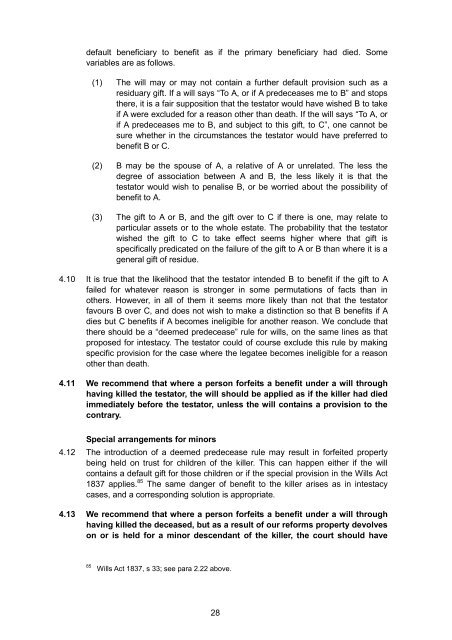The Forfeiture Rule and the Law of Succession ... - Law Commission
The Forfeiture Rule and the Law of Succession ... - Law Commission
The Forfeiture Rule and the Law of Succession ... - Law Commission
Create successful ePaper yourself
Turn your PDF publications into a flip-book with our unique Google optimized e-Paper software.
default beneficiary to benefit as if <strong>the</strong> primary beneficiary had died. Some<br />
variables are as follows.<br />
(1) <strong>The</strong> will may or may not contain a fur<strong>the</strong>r default provision such as a<br />
residuary gift. If a will says “To A, or if A predeceases me to B” <strong>and</strong> stops<br />
<strong>the</strong>re, it is a fair supposition that <strong>the</strong> testator would have wished B to take<br />
if A were excluded for a reason o<strong>the</strong>r than death. If <strong>the</strong> will says “To A, or<br />
if A predeceases me to B, <strong>and</strong> subject to this gift, to C”, one cannot be<br />
sure whe<strong>the</strong>r in <strong>the</strong> circumstances <strong>the</strong> testator would have preferred to<br />
benefit B or C.<br />
(2) B may be <strong>the</strong> spouse <strong>of</strong> A, a relative <strong>of</strong> A or unrelated. <strong>The</strong> less <strong>the</strong><br />
degree <strong>of</strong> association between A <strong>and</strong> B, <strong>the</strong> less likely it is that <strong>the</strong><br />
testator would wish to penalise B, or be worried about <strong>the</strong> possibility <strong>of</strong><br />
benefit to A.<br />
(3) <strong>The</strong> gift to A or B, <strong>and</strong> <strong>the</strong> gift over to C if <strong>the</strong>re is one, may relate to<br />
particular assets or to <strong>the</strong> whole estate. <strong>The</strong> probability that <strong>the</strong> testator<br />
wished <strong>the</strong> gift to C to take effect seems higher where that gift is<br />
specifically predicated on <strong>the</strong> failure <strong>of</strong> <strong>the</strong> gift to A or B than where it is a<br />
general gift <strong>of</strong> residue.<br />
4.10 It is true that <strong>the</strong> likelihood that <strong>the</strong> testator intended B to benefit if <strong>the</strong> gift to A<br />
failed for whatever reason is stronger in some permutations <strong>of</strong> facts than in<br />
o<strong>the</strong>rs. However, in all <strong>of</strong> <strong>the</strong>m it seems more likely than not that <strong>the</strong> testator<br />
favours B over C, <strong>and</strong> does not wish to make a distinction so that B benefits if A<br />
dies but C benefits if A becomes ineligible for ano<strong>the</strong>r reason. We conclude that<br />
<strong>the</strong>re should be a “deemed predecease” rule for wills, on <strong>the</strong> same lines as that<br />
proposed for intestacy. <strong>The</strong> testator could <strong>of</strong> course exclude this rule by making<br />
specific provision for <strong>the</strong> case where <strong>the</strong> legatee becomes ineligible for a reason<br />
o<strong>the</strong>r than death.<br />
4.11 We recommend that where a person forfeits a benefit under a will through<br />
having killed <strong>the</strong> testator, <strong>the</strong> will should be applied as if <strong>the</strong> killer had died<br />
immediately before <strong>the</strong> testator, unless <strong>the</strong> will contains a provision to <strong>the</strong><br />
contrary.<br />
Special arrangements for minors<br />
4.12 <strong>The</strong> introduction <strong>of</strong> a deemed predecease rule may result in forfeited property<br />
being held on trust for children <strong>of</strong> <strong>the</strong> killer. This can happen ei<strong>the</strong>r if <strong>the</strong> will<br />
contains a default gift for those children or if <strong>the</strong> special provision in <strong>the</strong> Wills Act<br />
1837 applies. 85 <strong>The</strong> same danger <strong>of</strong> benefit to <strong>the</strong> killer arises as in intestacy<br />
cases, <strong>and</strong> a corresponding solution is appropriate.<br />
4.13 We recommend that where a person forfeits a benefit under a will through<br />
having killed <strong>the</strong> deceased, but as a result <strong>of</strong> our reforms property devolves<br />
on or is held for a minor descendant <strong>of</strong> <strong>the</strong> killer, <strong>the</strong> court should have<br />
85 Wills Act 1837, s 33; see para 2.22 above.<br />
28
















